In July of 2017, my husband and I adopted a 7 year old girl with micropthalmia. She was born blind.
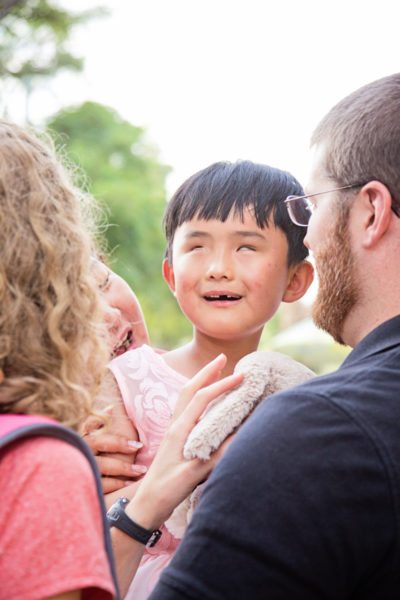
In Part 1 of this series, I talked about what it was like to meet Lydia as well as some of the activities we discovered to help with early bonding.
Here is more of our story about our girl with special eyes.
We look back at our time in China and laugh. It really is a blur and in a way reminds me of the time at the hospital after my son was born, and during those early weeks and months when his feeding and sleep schedule led us to be in survival mode. Fortunately, the hard parts of both of those times are just funny memories now. There is a reason people say that the China trip is NOT a vacation and tell you to just get through it. It really is a time to lean into your faith, your spouse, other adoptive families, and trust that God has equipped you enough to just get through it.
Surprises
There were many things that surprised us during our first two weeks with Lydia. She didn’t seem to have many of the issues we thought she would. She didn’t hoard food or want to eat everything in sight. She only wanted to eat certain foods at meal time (egg soup, strawberry yogurt, fruit and noodles) and actually didn’t eat very much due to how scared she was. Also, she came to us very clean with no smell, lice, rashes or anything. Her fingernails and toenails were immaculately cut. She loved washing her hands (and arms, towels and clothes!) with soap and would often wash her hands twice if we let her!
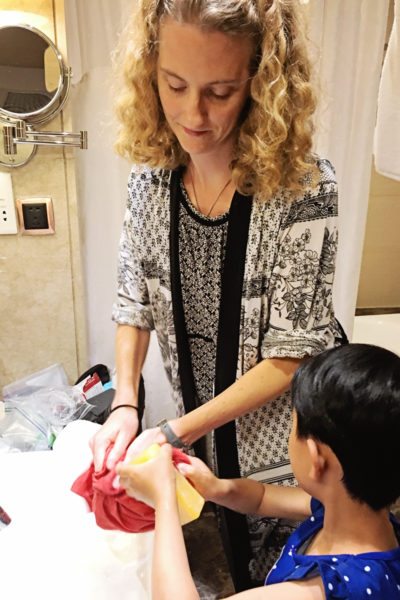
In fact, due to her blindness some of the issues we had been warned about were actually easier. For example, other children would go crazy at the buffet breakfasts. They saw all of the food available and could not regulate well. But, Lydia was dependent on us. And because she could not see the food, she was perfectly happy to have us provide appropriate amounts for her.
I was surprised at her response when I left on the third or fourth day in China to go to the store. She cried the whole time I was gone! I heard about this happening but it was a shock when it actually happened. It took about 7 weeks for me to be able to leave the house without her. In the beginning, Mama was her safety blanket. She needed me and at first I was everything to her. She needed to be able to call “Mama!” and have me respond to her. So in China, I had my “me” time sitting on the floor in the bathroom or very close by with earphones in. (Mama still needed time to refuel!) Now, her bond with both Mom and Dad is strong and we can both leave the house and leave her at school with her teachers.
Nothing prepared me for caring for a kid who didn’t know how to play with dolls or stuffed animals, draw, use stickers, and things like that.
After we met, I began to see that I had to scale back my expectations of our early interactions. We would not be bonding over reading books, painting our nails or playing with a stuffed animal – most of our early bonding time was through eating, music, or self care. We also enjoyed playing on her Amazon Fire tablet together. We played Mandarin kids’ apps and watched home made videos over and over especially of her little brother who was in America. (And we brought head phones for the airplane and those were a big hit!)
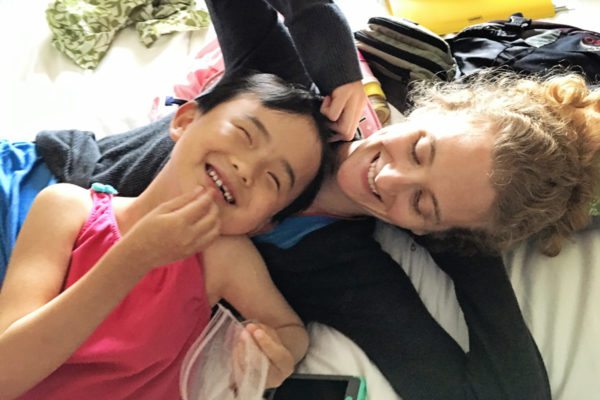
Communication
When I think about communicating with our daughter in the early weeks and months I remember the advice to just get through it. During our first few days together in China, Baba remembers following Lydia around for about 15 minutes as Lydia frantically walked through an empty restaurant looking for a bathroom, but had no way to communicate that need to him. Eventually, a Chinese woman was able to translate what she needed. Poor girl!
I will be honest, the communication barrier was hard (but not impossible.) The blindness coupled with the language barrier made communication extremely difficult on both sides. So in China, we tried to stick to doing things that crossed the language barrier like listening to music, tickling, playing catch with a beach ball (with some uncooked rice inside), simple self care (combing hair, washing each others hands, lotion, washing clothes, etc.) and eating. That is really all we did together when we weren’t doing adoption paperwork or touring. That’s it! We gave her space when she needed it and we drew near to her whenever she was interested in us.
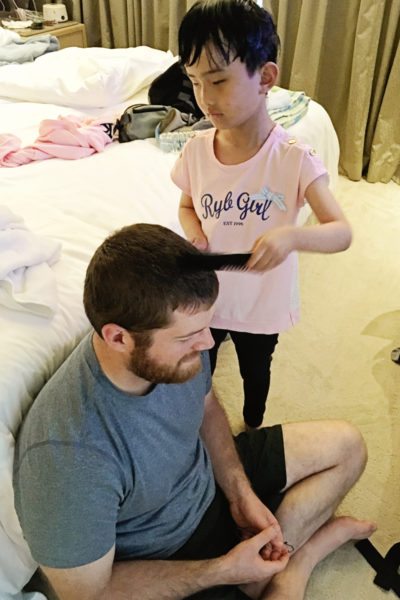
For the first several days, we relied heavily on our guide to communicate with our girl. Lydia has very little vision and we could not point to picture cards, food or objects to communicate with her. In addition, Baba’s many hours of Mandarin study did little to help with communication because Lydia spoke a dialect and not Mandarin itself. Also, her accent was so thick that we were not able to use the Google Translate app very much. However, we did use it to communicate (and sometimes MIScommunicate!) some simple words with her.
Fortunately, she was able to understand most of what other Mandarin speakers said to her. So our guide and other Mandarin speakers helped us communicate what her needs and desires were as well as what was going to happen each day.
We had planned on teaching Lydia some sign language right away. (I know… she is blind not deaf!) On the first and second day, the guide worked with our daughter several times to help her learn some basic sign language. Our guide did this by taking Lydia’s hands and making the sign with her while saying the Chinese word and then the English word. She learned how to make the sign for potty, all done, more, hungry (food) and thirsty (water) very quickly. Since Lydia could not just point to what she wanted or needed, sign language helped her communicate some of her basic needs to us. And as she signed, she started learning the word very quickly. If we adopt again, we will do this next time even if our child doesn’t have VI because it worked!
Another thing that we enjoyed in China was singing. I learned some Mandarin children’s songs from two of the CDs refered to in Part 1 of this series. Often she and I sang those songs together while we were waiting or walking somewhere. One of my adoptive mama friends suggested singing songs while doing some basic things such as walking to the potty, washing hands, walking, waiting, etc. My favorite made-up song we sang was “Walking to the potty, potty, potty, walking to the potty, po-o-tty!” I used a simple, invented tune and I promise it was nothing fancy but it was fun, it lightened the mood, helped with early language development, and created good memories. I remember singing and holding hands as I helped her find her way to the each and every bathroom. (I think she really enjoyed the free use of the bathroom as we went there often! Singing absolutely lifted MY mood and helped me deal with the repetitive nature of this task.) Occasionally she will sing the “Walking to the Potty” song and I am reminded of one of our sweet, early memories we created together.
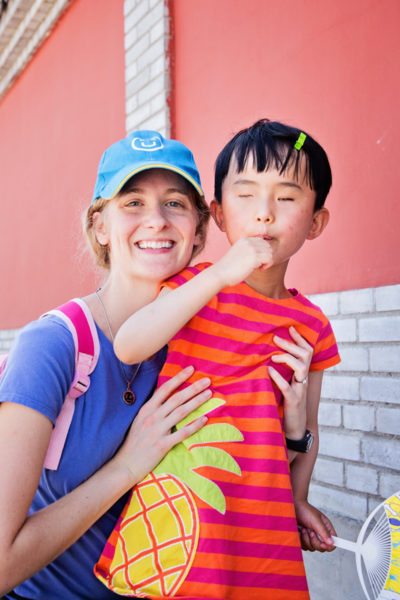
As I said earlier, while in China we relied heavily on people who could translate for us and we knew once we left China we would be on our own. (Again, just get through it!) So, before traveling to America we recorded our guide speaking several messages for Lydia to listen to at strategic times during our trip home. In them she said things like, “Keep your seat belt on. It will keep you safe,” (as she had never worn one before and she did NOT like keeping it on during our flight to Guangzhou) and, “We have arrived in America and have one more plane ride.” This helped her know what to expect. We look back and laugh about not being able to communicate during this challenging journey. We got through it and that is what matters now.
When we arrived home in America, the communication continued to be extremely difficult for the first few months. The blindness coupled with the language barrier led to lots of frustration on both sides. Sometimes, I just had to admit defeat knowing there is no way to explain to a screaming, blind child that, “There are birds (or a dog, a lawnmover, a firetruck, etc.) outside but they are far away.” I soon began to see that we could teach her simple English phrases like “far away” and “you are safe.” Fairly quickly she began repeating and taking comfort in these new words. Because she relies so heavily on language, she managed to learn the language incredibly quickly. (And having a younger brother who cuts her no slack for being blind or not speaking English fluently helped a ton!)
Patience, patience, patience… Again, we got through it.
Now
After being home for 9 months, Lydia is a completely different girl. She loves telling everyone, “My name is Lydia. I have black hair and I am from China. I have special eyes. I am blind.”
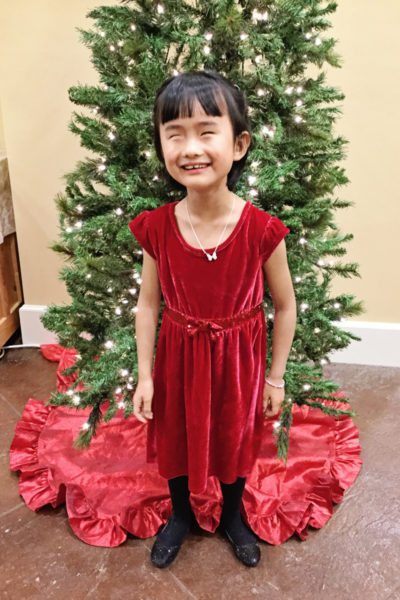
Since coming home, she has gained 10 pounds, 3 inches, and lost four teeth. She can carry on a preschool level conversation in English. She knows all of her letter sounds and can count to 100 (with a little help.) She knows 1/3 of the Braille alphabet. She loves playing with her 5 year old brother, and she sleeps through the night. She can get dressed and ready for school on her own (okay, so I help with her hair) and she already has a best friend at school. She regularly tells me, “I love you, Mom”. And she says, “Sorry!” when she does something wrong. She is getting over her fear of dogs, cats, bugs and birds and she calls out for us when she gets hurt. She loves her family fiercely and is so very happy with her new life.
After saying all that, I want you to hear that this first year of her being home has been the hardest of my life! Adopting an older child takes a lot of intentionality and commitment. But, we are so glad we took a leap of faith to adopt this precious sweet girl.
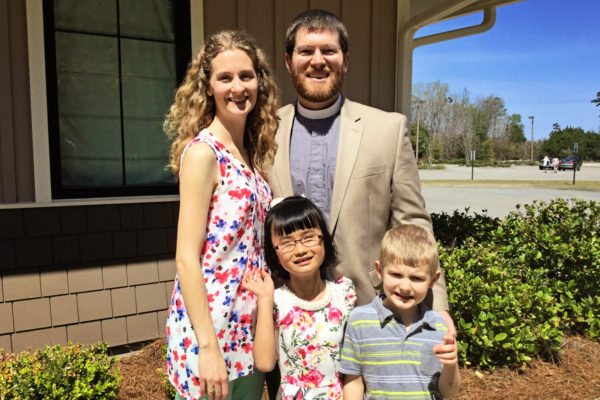
If you have any questions about adopting a blind child please send me a message!
– guest post by Tracy

























Would a cornea transplant help Lydia?
I don’t think so.
Tracy! I don’t know if you remember me, but my sister and I met you and your sweet girl in China when We were picking up our son Liam. I’m so glad to see how well she is doing! Beautiful family!
This is so beautiful. Proud to know you, mama. U have a special heart.
Tracy, thanks for sharing the story of your sweet little girl. We here at Epiphany miss you and your family. We pray that God continues to bless you and your family.